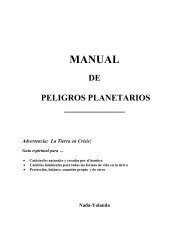ALIEN INTERVIEW - THE NEW EARTH - Earth Changes and The ...
ALIEN INTERVIEW - THE NEW EARTH - Earth Changes and The ...
ALIEN INTERVIEW - THE NEW EARTH - Earth Changes and The ...
Create successful ePaper yourself
Turn your PDF publications into a flip-book with our unique Google optimized e-Paper software.
<strong>The</strong> name of the Egyptian deity Aten transliterates into the Hebrew word Adon. Adon,<br />
which is translated by English Bibles as "the Lord" (<strong>and</strong> Adonai, translated as "my Lord") is<br />
used along with Jehovah (Yhwh) in the Bible as the exclusive personal names of God.<br />
Moreover, in ancient times, the name Jehovah (Yhwh) was written, but never spoken.<br />
Whenever the written name Jehovah (Yhwh) was to be read out loud, Adon (Aten) was<br />
voiced instead. <strong>The</strong> written form of Adon is infrequent, however, its limited usage is<br />
significant, especially in the first six books of the Bible (See under "LORD" in Strong's<br />
Exhaustive Concordance), where it is reserved for the following applications alone: Moses<br />
addresses God using the title Adon/Aten (Exodus 4:10,13; 5:22; 34:9; Numbers 14:17;<br />
Deuteronomy 3:23; 7:26; 10:17); Moses, himself, is addressed both by Aaron<br />
(Ex.32:22; Num.12:11) <strong>and</strong> by Joshua (Numbers 11:28) using the title Adon/Aten; <strong>and</strong><br />
Joshua also addresses God using the title Adon/Aten (Joshua 5:14 b; 7:7). As<br />
mentioned above, there is an established relationship between the literature of the Egyptian<br />
18th Dynasty <strong>and</strong> the Bible. Psalm 104 is an embellishment of the Hymn to the Aten which<br />
was found by archaeologists at the city of Akhetaten."<br />
http://www.domainofman.com/ankhemmaat/moses.html<br />
"Recent <strong>and</strong> non-Biblical view places Moses as a noble in the court of the Pharaoh<br />
Akhenaten. A significant number of scholars, from Sigmund Freud to Joseph Campbell,<br />
suggest that Moses may have fled Egypt after Akhenaten's death (ca. 1334 BC) when many<br />
of the pharaoh's monotheistic reforms were being violently reversed. <strong>The</strong> principal ideas<br />
behind this theory are: the monotheistic religion of Akhenaten being a possible<br />
predecessor to Moses' monotheism, <strong>and</strong> the "Amarna Letters", written by nobles to<br />
Akhenaten, which describe raiding b<strong>and</strong>s of "Habiru" attacking the Egyptian territories in<br />
Mesopotamia."<br />
-- Reference: Wikipedia.org<br />
104 "...Amenhotep III..."<br />
"Amenhotep III, meaning Amun is Satisfied was the ninth pharaoh of the Eighteenth<br />
dynasty. According to different authors, he ruled Egypt from June 1391 BC-December 1353<br />
BCE or June 1388 BCE to December 1351 BC/1350 BCE after his father Thutmose IV died.<br />
Amenhotep III was the son of Thutmose IV by Mutemwia, a minor wife of Amenhotep's<br />
father. Amenhotep III fathered two sons with his Great Royal Wife Tiye, a great queen<br />
known as the progenitor of monotheism via the Crown Prince Tuthmose who predeceased<br />
his father, <strong>and</strong> his second son, Akhenaten, who ultimately succeeded him to the throne."<br />
-- Reference: Wikipedia.org<br />
105 "...Akhenaten..."<br />
"Akhenaten, meaning Effective spirit of Aten, first known as Amenhotep IV (sometimes read<br />
as Amenophis IV <strong>and</strong> meaning Amun is Satisfied) before his first year, was a Pharaoh of the<br />
Eighteenth dynasty of Egypt. He is especially noted for attempting to compel the Egyptian<br />
population in the monotheistic worship of Aten, although there are doubts as to how<br />
successful he was at this.<br />
Amenhotep IV succeeded his father after Amenhotep III's death at the end of his 38-year<br />
reign, possibly after a coregency lasting between either 1 to 2 or 12 years. Suggested dates<br />
for Akhenaten's reign (subject to the debates surrounding Egyptian chronology) are from<br />
1353 BCE - 1336 BCE or 1351 BCE – 1334 BCE Akhenaten's chief wife was Nefertiti.<br />
232





